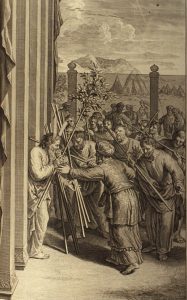Tomorrow’s ‘Parashot’ (weekly Torah portions) are ‘Matot’ {מטות} (Hebrew for ‘tribes’) and ‘Masei’ {מסעי} (Hebrew for ‘journeys’). Both together comprise the ninth and tenth ‘Parashahot’ in the Book of Numbers and can be found in Numbers 30:1 – 36:13. The two are the last weekly Torah portions of the Book of Numbers.
In one of our earlier posts, I mentioned the transformation process of the Hebrew word ‘Shevet’ {שבט} which has two meanings: ‘tribe’ and also ‘staff.’
The reason for the two different meanings is the leader of tribe held a staff that was associated with his leadership and later on – this staff – simply became a symbol for the whole tribe.

The same thing happened with the Hebrew word ‘Mateh’ {מטה} which can be understood in Hebrew as both the ‘tribe’ and the ‘clan’ as well as ‘staff’ or ‘rod.’ In fact, the famous ‘Aaron’s rod’ appears in the original Hebrew as ‘Mateh Aharon.’{מטה אהרן}
The opening verses of the weekly Torah portion says the following
“Moses spoke to the heads of the tribes of the people of Israel, saying, “This is what the LORD has commanded. If a man vows a vow to the LORD, or swears an oath to bind himself by a pledge, he shall not break his word. He shall do according to all that proceeds out of his mouth.” (Numbers 30:1-2)
The ‘Chatam Sofer’ {חת”ם סופר} – the ‘nickname’ of the 19th century Austro- Hungarian rabbi Moses Sofer – was wondering why Moses addressed the LEADERS of the tribes and not simply speak directly to the people? After all, the content of the next words Moses said was aimed for EVERYONE. The rabbi’s interesting answer was that in this particular case, when the Torah speaks about the issue of vows, pledges and promises there is a special emphasis on the leader. In other words, the ‘Chatam Sofer’ – reminds us that sometimes a leader has the ‘tendency’ to promise all kind of things to his people but sometimes the leader does not keep his promise…
That is the reason Moses addressed first – and especially – to the leaders of the tribes and emphasized ‘this is what the LORD has commanded.’
